Conservative Canadian leader infuriates Trudeau officials by BANNING sex change procedures for children, trans women from female sports and teachers from hiding pronoun changes in Alberta province
Transgender children under the age of 17 will be banned from undergoing gender reassignment surgery and puberty blockers will be banned for anyone under the age of 16, in a series of new measures announced by the head of Canada’s Alberta province.
Alberta Premier Danielle Smith detailed the policy change in a video posted to her social media on Wednesday.
Smith, a member of the United Conservative Party, said the goal was to protect children while expanding transgender care services for adults. She has angered officials from Canadian Prime Minister Justin Trudeau’s Liberal Party, which has taken a so-called “affirmative” position on procedures for children who say they are transgender.
She said she wanted all people to feel welcome and supported in Alberta — a sparsely populated province of 4.4 million people bordering British Columbia in western Canada, with Calgary as its largest city.
But, she said, she wasn’t willing to roll the dice on “complex and often-changing emotions of those teenagers.”
“Making permanent and irreversible decisions about a person’s biological sex while he or she is still young can severely limit that child’s choices in the future,” Smith said.
Alberta Premier Danielle Smith will announce changes to policy regarding trans youth on Wednesday
She said opting for life-changing medical procedures “poses a risk to that child’s future.”
Under Smith’s new policy, all children under the age of 17 will not be allowed to undergo upper or lower surgery.
Children 15 years and younger should not use puberty blockers and hormone therapy unless such therapy has already been started. Teenagers aged 16 and 17 can start hormone therapy, provided they have permission from their parents, a doctor and a psychologist.
Parents must give permission before a student aged 15 and under may use a name or pronoun at school other than the one given at birth: children aged 16 and 17 do not require parental consent, but schools must inform you of this. parents.
Teaching materials on sexuality and gender orientation require approval from the province’s Ministry of Education, and parents must register for each lesson, rather than opting out.
Finally, transgender girls are not allowed to participate in girls’ sports.
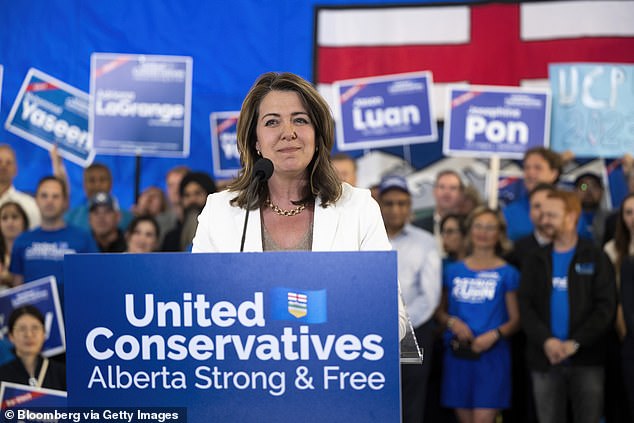
Smith is seen campaigning for re-election in May 2023. She worked in media before politics
Smith said they were working to create both co-ed and gender-neutral competitions in response to the ban.
“I strongly believe that those who were born male but transitioned to or identify as female have the opportunity to participate in sports in a meaningful way,” she said.
“However, there are clear biological realities that give transgender athletes a tremendous biological advantage over women and girls.”
She said girls “should not be forced to compete with biologically stronger transgender athletes.”
Smith, a 52-year-old former media personality who has governed Alberta since October 2022, said she appreciated the sensitivity of the topic.
“I understand how controversial and divisive discussions about transgender issues can be,” she said, adding that she was trying to “depoliticize the discussion and focus on the well-being of those involved.”
She said she was also working to improve access to health care for trans adults living in her province.
Currently, they have to cross the country for specialist care in Quebec – Alberta’s capital, Edmonton, is 3,700 kilometers from Quebec City.
Dr. David Jacobs, president of the Ontario Association of Radiologists, praised the policy.
“This is a balanced and reasonable approach to an extremely complex social, medical, biological and sexual issue,” he said. ‘It’s worth a listen.’
Eva Kurilova, a writer who describes herself as “Canada’s leading lesbian,” wrote on
And civil rights lawyer Lisa Bildy wrote: “Good job, Prime Minister! You handled the issue with grace, humanity and common sense.
“You won’t make everyone happy, but the protection of children and young people (from ideologues, especially in schools) and fairness in sport were desperately needed, and this policy will deliver on both.”
Smith’s plan, praised by some as moderate and rational, puts her on a collision course with Justin Trudeau, the Canadian prime minister.
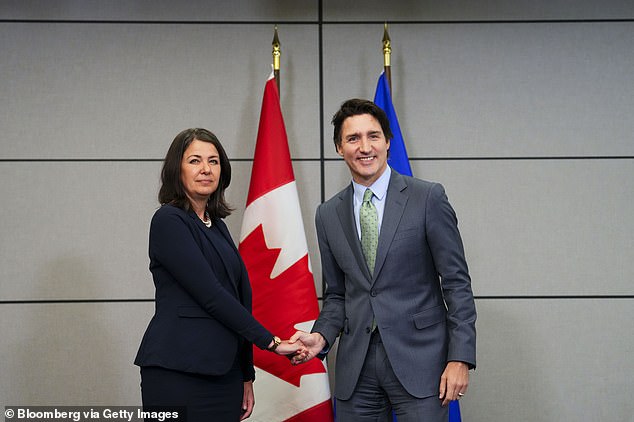
Smith is seen with Justin Trudeau in February 2023, at a rally in Ottawa
Trudeau’s Youth Minister Marci Ien said she was “incredibly disappointed” by Smith’s move and said such policies are deliberately “dangerous.”
Kristopher Wells, the Canada Research Chair for the Public Understanding of Sexual and Gender Minority Youth, also sharply criticized Smith’s changes.
“It’s an outright attack on trans and 2SLGBTQ+ communities,” Wells, who is at MacEwan University in Edmonton, wrote on X.
‘There is no evidence or research to support these recommendations.
“It’s not just immoral, it’s illegal.”
The Canadian government is known for being progressive on transgender issues. Last year, a transgender teacher, Kayla Lemieux, sparked outrage by showing up to work wearing enormous prosthetic breasts and a blonde wig, only to later swap them for regular men’s clothing.
The province of Ontario, where Lemieux works, declined to take action against her.
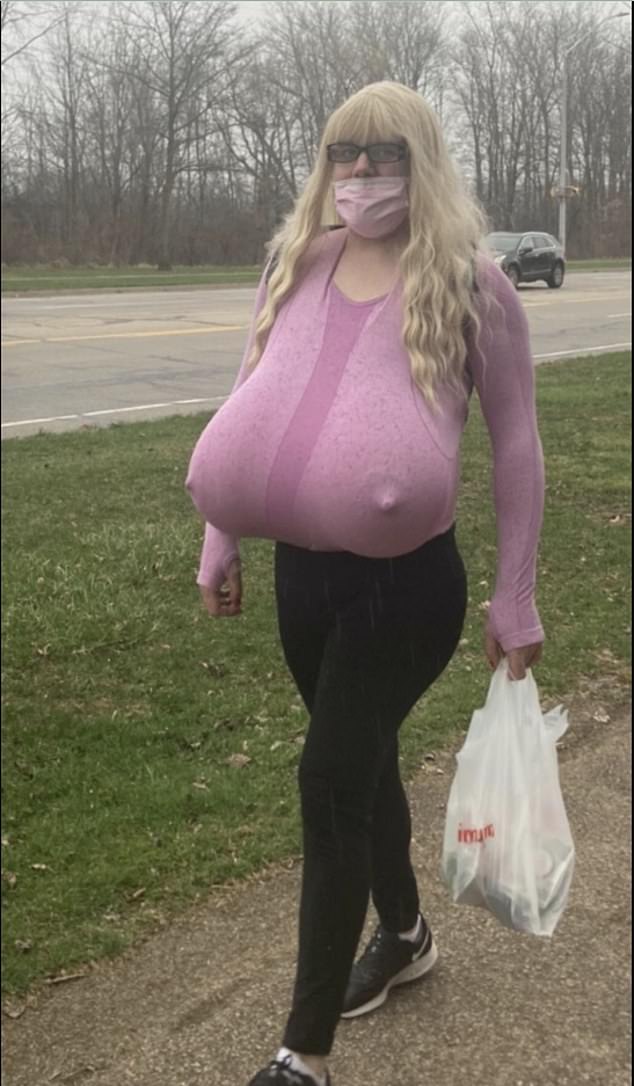
Kayla Lemieux caused chaos last fall when photos circulated showing enormous breasts while she worked at a Canadian high school
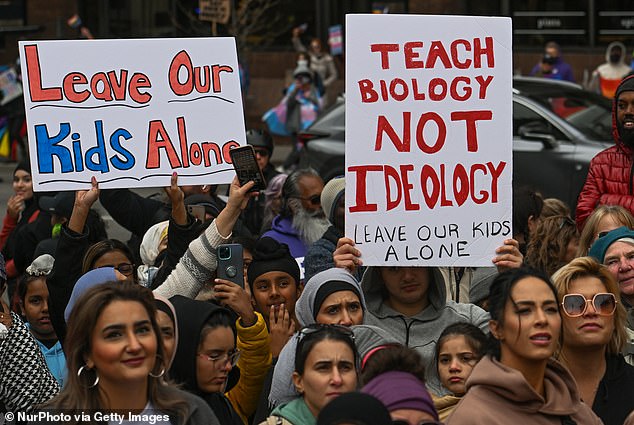
Protesters are pictured in Calgary on September 20 raising concerns about gender education in schools
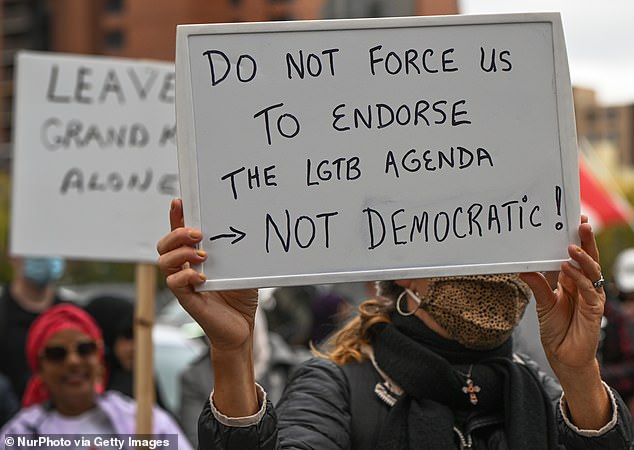
The Calgary activists took to the streets to call for stricter regulations on LGBTQ+ education in Alberta
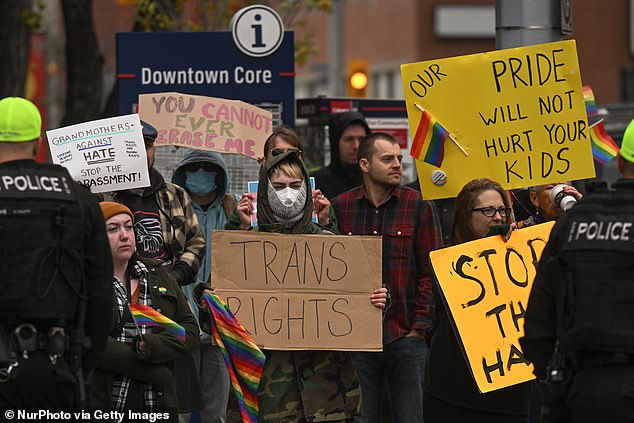
Counter-protesters are seen in Calgary on September 20 calling for an end to the ‘harassment’ of trans children
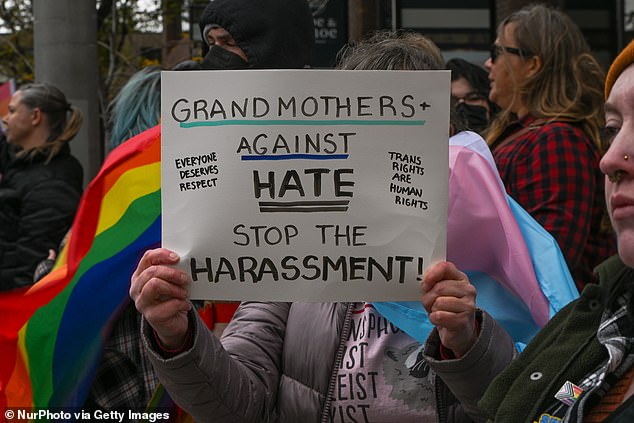
Members of the LGBTQ2+ community and allies stand in opposition across the street from the Million March 4 Children rally in downtown Calgary on September 20
Smith will hold a news conference Thursday to provide more details.
Alberta becomes the third province to announce a parental consent requirement in schools, CTV News reports.
Saskatchewan and New Brunswick introduced similar rules last year, requiring students aged 16 and younger to change their name or pronouns. Protests and legal challenges followed.
Saskatchewan also invoked the rarely used notwithstanding clause to override certain Charter rights when transposing the policy into law.
In the United States, 19 states have introduced some form of restrictions for trans youth.
The Human Rights Campaign, the largest LGBTQ advocacy group in the U.S., declared the first-ever national emergency for the LGBTQ+ community in June in response to the surge in legislation.
